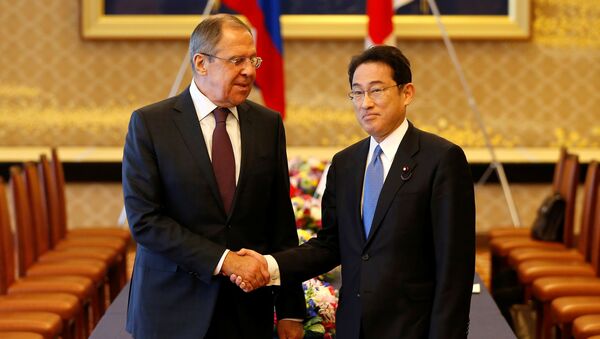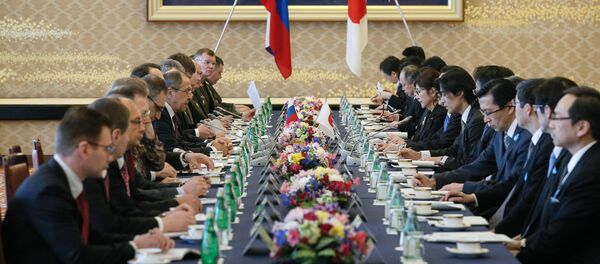In an interview with Radio Sputnik, political expert Valery Korovin said the countries have very good prospects in establishing fruitful bilateral relations. However, this would only be possible when Japan decreases its dependence on the United States.
"Nothing will happen as long as there is a third party in bilateral relations between Russia and Japan, namely the "American Cerberus" who can stop any negotiations at any time, cancel any decisions, make adjustments that will undo all the efforts of Russian diplomacy and Russian-Japanese relations as a whole.
Therefore, when Japan will liberate itself from persistent US guardianship, then everything will be fine," the expert said.
According to Korovin, Japan lets the United States to alter its decisions and politics.
"The Americans simply treaded Japan down, deprived it not only of its sovereignty, but also of its cultural independence, of its own identity, and all this — under the pretext of ensuring security in the event of possible aggression by the USSR. But the USSR no longer exists. Today there are no reasons for an American presence in Japan, moreover, there is no danger that Japan can't cope with," Korovin argued.
During the meeting, the foreign and defense ministers of the two countries discussed confidence-building measures in the Asia-Pacific region (APR), deployment of the US missile defense system, expansion of joint naval exercises, as well as North Korea's nuclear program.
On March 6, the media reported that North Korea fired four ballistic missiles, and three landed in Japan's exclusive economic zone. According to the Japanese Defense Ministry, the missiles did not inflict any damages. However, the issue remains as acute as before.
"We held an in-depth exchange of views on the North Korea nuclear and missile issues and agreed to urge North Korea to refrain from further provocative actions, as well as to comply with the UN Security Council resolutions," Kishida said at a joint press conference following the 2+2 format consultations.
"The economy is the safest and most acceptable issue that could bring Japan and Russia together and contribute to their friendship and cooperation," Korovin said.
Russian diplomat and head of the Department of Diplomacy at MGIMO Alexander Panov also assessed the meeting in a positive way. In particular, he viewed the current negotiations as an important step towards restoring political dialogue between the countries.
"What is happening now is a step in the right direction. The "2+2" meeting is a rare format used by Japan. And this is not only a practical step, but also an indicator of our very good political contacts," Panov stated.
Moscow and Tokyo never signed a permanent peace treaty after World War II due to a disagreement over an archipelago, which Russia calls the Southern Kurils and Japan the Northern Territories, encompassing the islands of Iturup, Kunashir, Shikotan and Habomai.
Russian President Vladimir Putin and Japanese Prime Minister Shinzo Abe held talks on resolving the issue of the Kurils in late 2016. In December, Putin and Abe agreed to establish joint economic activities on the Southern Kurils in a bid to create a favorable atmosphere for talks on a peace treaty between the countries.



